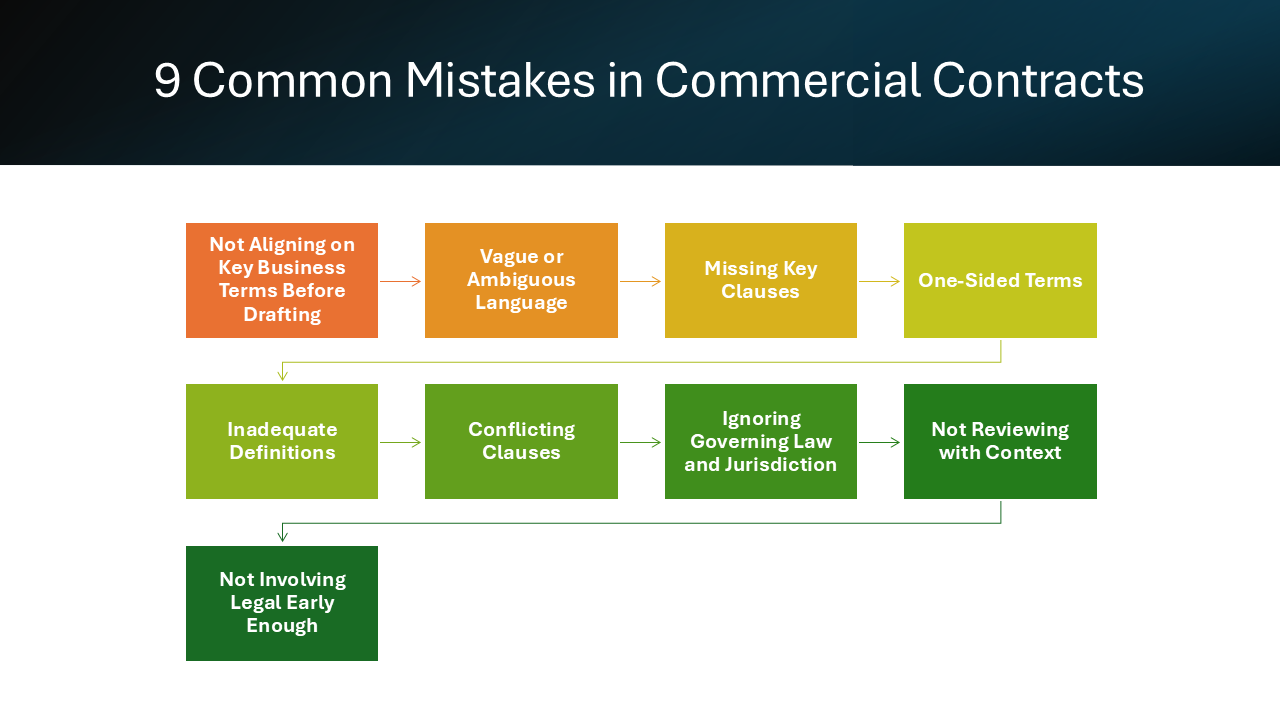
Commercial contracts are the backbone of business transactions, but even seasoned negotiators can overlook critical elements during the drafting process. Here are nine common mistakes to avoid, along with practical ways to get contracts right the first time.
Mistake 1: Not Aligning on Key Business Terms Before Drafting
Why it matters: Jumping into drafting without alignment leads to fundamental disagreements, wasted time, and major revisions.
Example: Parties begin drafting without confirming deal scope or payment structure, only to realize later they had completely different expectations.
How to avoid it: Agree on core terms — scope, pricing, responsibilities — before touching the template.
Mistake 2: Vague or Ambiguous Language
Why it matters: Ambiguity invites disputes and weakens enforceability.
Example: One party promises "reasonable efforts" while the other expects "best efforts" — two very different legal standards.
How to avoid it: Define subjective terms clearly and use precise, consistent language.
Mistake 3: Missing Key Clauses
Why it matters: Omitting essential clauses such as dispute resolution or termination rights leaves the business exposed to unnecessary risk.
Example: A force majeure event occurs, but the contract has no relevant clause, leaving both parties in a gray zone.
How to avoid it: Use Legal-approved templates or contract software with built-in clause libraries to ensure comprehensive coverage.
Mistake 4: One-Sided Terms
Why it matters: Pushing overly aggressive terms slows negotiations and may render clauses unenforceable.
Example: Including a 100% liability cap on the counterparty leads to immediate pushback and delays.
How to avoid it: Aim for balanced terms that protect your interests while remaining commercially acceptable.
Mistake 5: Inadequate Definitions
Why it matters: Poor definitions cause confusion and conflict across the entire contract.
Example: Undefined terms like "services" or "territory" lead to conflicting interpretations — and disputes — after the contract is signed.
How to avoid it: Clearly define all key terms in a dedicated section and use them consistently.
Mistake 6: Conflicting Clauses
Why it matters: Internal contradictions undermine mutual understanding and create legal risk.
Example: A contract spliced from multiple sources includes two different governing law provisions.
How to avoid it: Review carefully for internal consistency and use contract review software to validate cross-references.
Mistake 7: Ignoring Governing Law and Jurisdiction
Why it matters: Unclear or unsuitable choices here complicate enforcement and increase risk.
Example: A US company uses a UK law clause without realizing it limits certain remedies.
How to avoid it: Always specify governing law and jurisdiction aligned with strategic priorities.
Mistake 8: Not Reviewing with Context
Why it matters: Templates don’t fit every transaction. Context matters.
Example: A template’s standard limitation of liability clause fails to account for data breach risks or compliance fines — crucial elements for a software licensing deal involving sensitive data.
How to avoid it: Adapt the contract language to the specific nuances of the business deal at hand. Replace entire clauses if necessary.
Mistake 9: Not Involving Legal Early Enough
Why it matters: Delayed legal input leads to costly rework and inefficiency — or worse yet, post-signature disputes.
Example: Sales drafts key terms that Legal later flags as non-compliant, requiring multiple extra rounds of redlines.
How to avoid it: Use collaborative drafting tools to bring legal into the loop early and reduce friction.
Conclusion
Avoiding these mistakes helps ensure that your commercial contracts are not only enforceable, but also aligned with your business goals. Whether you're drafting from scratch or reviewing third-party paper, a proactive and thoughtful approach pays dividends.
Looking to streamline your contract process? Get a demo to see how BoostDraft can help prevent these common issues and speed up negotiation.

